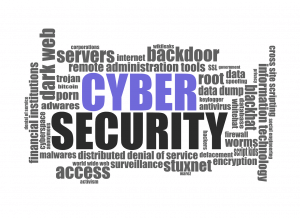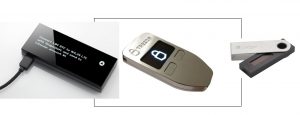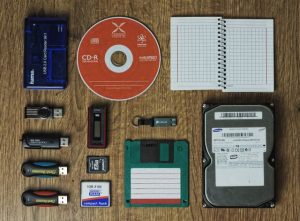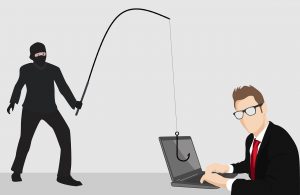[responsivevoice_button buttontext=”Listen to this post”]
 1. INTRODUCTION
1. INTRODUCTION
Before you buy a single coin you should understand how thieves could steal your funds, and how to protect your cryptocurrency from that possibility. By reading these pages you will learn about both.
Here we have tried to identify many of the common risks of cryptocurrency theft as well as standard ways of protecting your currency. But be aware that the risks and protection of cryptocurrency is an ever-evolving environment. There will always be new risks and new protections that you may not find on this page.
Some of the following advice may seem extreme – and sometimes it is. Other times it might be a reasonable precaution that you don’t understand yet. In either case, if the advice is easy to do then we strongly suggest that you do it. To protect your funds you should take the general philosophy, in all things related to digital security, to be more cautious rather than less. Every year hacking gets more common, more destructive and security gets more important. Also, the more money you have tied up in cryptocurrency, the more steps you should take to secure it.
Remember that cryptocurrency transactions are irreversible. So if a thief gets your currency then you are not going to get it back. Even the police and FBI can’t get it back for you. So be careful and follow these suggestions.
In the following text, when we use the word general word “device” we mean a computer-based system that allows you to access your cryptocurrency. Such as: your computer, laptop, tablet, phone, or any browser.
For simplicity when we say “Secret Codes” we are referring to any code that you need to keep private and secret. These include your Private keys, PINs, Passwords, and/or your Seed Phrase. If we are discussing a subset of these codes then we will be more specific.
Not to be too repetitive but Do NOT buy cryptocurrency until you understand how to secure it.
Return to TOC or jump to comments
 2. HOW THINGS CAN GO WRONG
2. HOW THINGS CAN GO WRONG
There are three principal ways that you can lose your cryptocurrency funds:
- Hackers get your secret code(s)
- Hackers get access to the exchange where you may have kept your funds
- You simply lose or forget your secret code(s)
2.1 HACKERS STEAL YOUR CODES
The most common way that you can lose your funds is if a thief can find your Secret code(s). They may be able to find where you have written them down on paper, or where you have recorded them in your computer or phone, or they may install malware on your computer to capture the codes in other ways.
Hackers can also reset your password(s) if they can discover enough personal information about you.
Note that a hacker may discover your Secret codes on the very first day you created them but that hacker may not actually steal your MONEY until you have enough coins in your wallet to make it worth their while. And all that time you may have been feeling safe because your coins kept growing without theft – until that one fateful day. So that is why it is critical to understand cryptocurrency security before the very first day you buy coins.
If you do ever suspect that you may have been sloppy with your Secret codes in the past then there there is a easy solution – you can start again and move all your coins to a new, safer wallet.
2.2 HACKERS BREAK INTO YOUR CRYPTOCURRENCY EXCHANGE
Hackers can also attack the exchange where you may have kept some of your funds. There is not much you can do about that except to never leave your funds at the exchange where you bought them.
2.3 LOST CRYPTOCURRENCY CODES
It is shocking to know now many millions of dollars in cryptocurrency has been literally lost with no hacking involved. Most commonly people forget where they stored their secret codes, or the device that stored their codes was destroyed or discarded. Once these codes are lost then the currency associated with those codes is also lost forever – or until you can recover those codes.
Here are a few more specific ways that your keys and your funds can be lost (forever):
- Not protecting your wallet with a password or PIN.
- Reusing passwords that you have previously used for other accounts.
- Using very simple and very common passwords and PINs.
- Forgetting your secret codes.
- Not having any backup of your secret codes.
- Saving an unencrypted backup copy of your Secret Codes.
- Writing your codes down and not hiding them well enough.
- Not backing up your Private Keys frequently enough.
- A natural (or unnatural) disasters could destroy your codes/computer/phone/paper via fire, flood, tornado, earthquake,…
- Using an Exchange or Web wallet that does not properly protect your login information.
- Using an Exchange or Web wallet that does not properly protect their customer database.
- Falling victim of a “phishing” attack.
- Having malware on your device which can monitor your password/PIN keystrokes and record keys as they are generated by your wallet.
- Using your office computers which have been set up to legitimately monitor your internet traffic.
- Buying an already-hacked hardware wallet.
- Sending funds to the wrong receiver.
- Allowing your identity to be “Social Engineered”.
- Not using Two Factor Authentication (2FA).
- Connecting to a hacked wifi access point.
- Relying on so-called “Trusted” third parties to fulfill your transaction.
Return to TOC or jump to comments
 3. HOW TO PROTECT YOURSELF
3. HOW TO PROTECT YOURSELF
Given all of the risks that we have described above regarding how you can lose you cryptocurrency, we will now tell you how you can avoid those risks and loses.
Your first and main line of defense will be your cryptocurrency wallet. Some wallets are inherently safer than others – you often sacrifice convenience for security. Wallets provide many ways to protect your coins but not all wallet protections come with every type of wallet, nor are those protections always automatic.
You can learn about the various types of cryptocurrency wallets here.
Choose a secure wallet and then enable all security features.
But just having a very secure wallet is not the end of the story. Even with a great wallet, you can still expose yourself to many risks if you don’t use your wallet properly and take proper precautions. One of the most common loss of coins is due to wallet owners who do not follow security recommendations.
Below we have created categories of potential risks. Then we describe what reasonable and common protective measures you can take against those risks. We have also listed what we call “To be even more secure” steps. These steps will make you even safer but they may not be very convenient, or they may protect you against a possible, but very unlikely theft scenario.
All of the following are suggestions. Please follow at least some of them – the more the better. These tips are given in no specific order.
Return to TOC or jump to comments
3.1 BASIC KEYS SECURITY
Soon to be updated
Return to TOC or jump to comments
 3.2 SEND-TO ADDRESS SECURITY
3.2 SEND-TO ADDRESS SECURITY
If you send your funds to the wrong address then you will lose those funds – forever. There is no realistic recovery. To prevent this possibility, follow our “Send-to address” security tips.
Return to TOC or jump to comments
3.3 2FA – TWO FACTOR AUTHENTICATION
Two Factor Authentication (2FA) reduces the chance that a hacker can break into your accounts. It means that you have optionally chosen to require more than just your password in order to access your accounts. It is usually used for cryptocurrency and other financial accounts, but it can also be used with your other non-financial accounts, like Facebook, email, Amazon, and others. Read all of our 2FA security usage tips to learn how to protect yourself using this feature.
Return to TOC or jump to comments
 3.4 PAPER WALLET SECURITY
3.4 PAPER WALLET SECURITY
The keys for a Paper wallet are usually created by using a browser-based “Private Key Generator” program. This will create a new private key for each paper wallet that you want. Then those keys will be either printed or handwritten. If you are unfamiliar with this kind of wallet then read our Cryptocurrency Paper Wallet Guide first.
Paper wallet security must be followed both when you are creating your private keys, and also when you are printing and storing your Paper wallet in a safe place.
To protect your Paper wallet take the following steps:
Return to TOC or jump to comments

KeepKey, Trezor, Leger Hardware wallets
3.5 HARDWARE WALLET SECURITY
A Hardware wallet is one of your safest bets for security. They are not free, but they can be well worth the cost. If you are unfamiliar with this kind of wallet then read our Cryptocurrency Hardware Wallet Guide first.
To protect yourself take the following steps:
Return to TOC or jump to comments
 3.6 BACKUP SECURITY
3.6 BACKUP SECURITY
To protect your cryptocurrency from accidental loss (i.e. your fault, not a hacker’s), you need to back up your Secret codes. Follow these security tips to be sure you being as safe as possible when making these backups:
Return to TOC or jump to comments
 3.7 PHISHING SECURITY
3.7 PHISHING SECURITY
Phishing is a technique used by a hacker in order to trick you into giving them critical information, such as your Secret codes. They may also trick you into sending currency to them or downloading malware. Use the following tips to help prevent you from being the next victim of a phishing attack:
Return to TOC or jump to comments
 3.9 SOFTWARE WALLET SECURITY
3.9 SOFTWARE WALLET SECURITY
Cryptocurrency software wallets are one of your primary defenses against cryptocurrency theft so you will want to be sure that the wallet you are using gives you the best protection. Follow these security tips to make your cryptocurrency transactions even more secure.
Return to TOC or jump to comments

Malware can steal your cryptocurrency funds
3.10 VIRUS / MALWARE SECURITY
Malware is a malicious software program that could be secretly running on your computer. This type of program is one tool that hackers can use to steal your cryptocurrency. Follow our anti-malware tips in the following link to learn how to reduce your risk of infection and cryptocurrency loss.
Return to TOC or jump to comments

cryptocurrency WiFi security guide best tips
3.11 WIFI SECURITY
Using WiFi can be a risky proposition. WiFi can be hacked and so when you use it you can be exposing your critical information to thieves. Read our WiFi security guide to understand the various ways that this hacking can occur, and the things you can do to keep your cryptocurrency (and your entire online life) safer.
Return to TOC or jump to comments
3.12 BROWSER SECURITY
Soon to be updated
Return to TOC or jump to comments
3.13 OTHER / VARIOUS SECURITY TIPS
Soon to be updated
Return to TOC or jump to comments
3.14 RECEIVE ADDRESS REUSE SECURITY
Soon to be updated
Return to TOC or jump to comments
COMMENTS
Please tell us your tips below and we will add them. Or let us know if you think we are mistaken in any of these tips.
